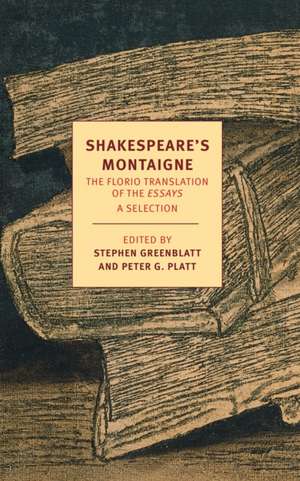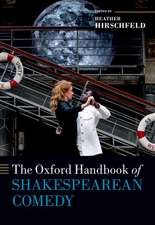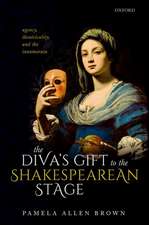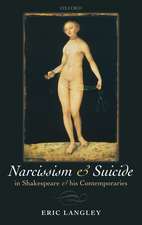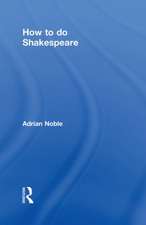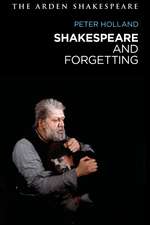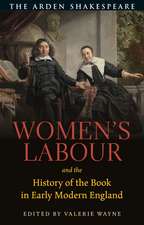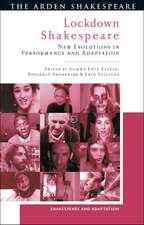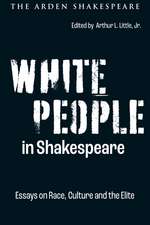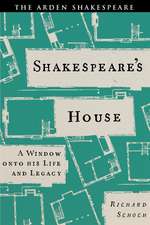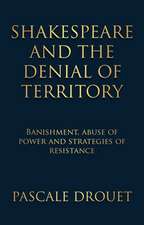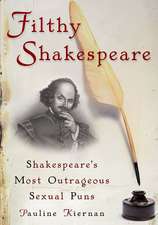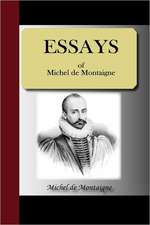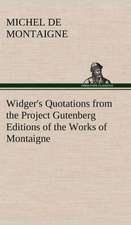Shakespeare's Montaigne: New York Review Books Classics
Autor Michel de Montaigneen Limba Engleză Paperback – 4 iun 2014
Shakespeare, Nietzsche once wrote, was Montaigne’s best reader. It is a typically brilliant Nietzschean insight, capturing the intimate relationship between the ever-changing record of the mutable self constituted by Montaigne’s Essays and Shakespeare’s kaleidoscopic register of human character. For all that, how much Shakespeare actually read Montaigne remains a matter of uncertainty and debate to this day. That he read him there is no doubt. Passages from Montaigne are evidently reworked in both King Lear and The Tempest, and there are possible echoes elsewhere in the plays. But however closely Shakespeare himself may have pored over the Essays, he lived in a milieu in which Montaigne was widely known, oft cited, and both disputed and respected. This in turn was thanks to the inspired and dazzling translation of his work by a man who was a fascinating polymath, man-about-town, and master of language himself, Sir John Florio.
Shakespeare’s Montaigne offers modern readers a new, adroitly modernized edition of Florio’s translation of the Essays, a still-resonant reading of Montaigne that is also a masterpiece of English prose. Florio’s translation, like Sir Robert Burton’s Anatomy of Melancholy and the works of Sir Thomas Browne, is notable not only for its stylistic range and felicity and the deep and lingering music of many passages, but also for having helped to invent the English language as we know it today, supplying it, very much as Shakespeare also did, with new words and enduring turns of phrase. Stephen Greenblatt’s introduction also explores the echoes and significant tensions between Shakespeare’s and Montaigne’s world visions, while Peter Platt introduces readers to the life and times of Sir John Florio. Altogether, this book provides a remarkable new experience of not just two but three great writers who ushered in the modern world.
Din seria New York Review Books Classics
-
 Preț: 88.86 lei
Preț: 88.86 lei -
 Preț: 99.24 lei
Preț: 99.24 lei - 16%
 Preț: 79.25 lei
Preț: 79.25 lei -
 Preț: 77.73 lei
Preț: 77.73 lei -
 Preț: 124.55 lei
Preț: 124.55 lei -
 Preț: 98.73 lei
Preț: 98.73 lei -
 Preț: 83.30 lei
Preț: 83.30 lei -
 Preț: 182.63 lei
Preț: 182.63 lei -
 Preț: 102.47 lei
Preț: 102.47 lei -
 Preț: 76.46 lei
Preț: 76.46 lei -
 Preț: 174.64 lei
Preț: 174.64 lei -
 Preț: 110.73 lei
Preț: 110.73 lei -
 Preț: 119.57 lei
Preț: 119.57 lei -
 Preț: 94.01 lei
Preț: 94.01 lei -
 Preț: 119.36 lei
Preț: 119.36 lei -
 Preț: 101.24 lei
Preț: 101.24 lei -
 Preț: 85.97 lei
Preț: 85.97 lei -
 Preț: 142.67 lei
Preț: 142.67 lei -
 Preț: 102.25 lei
Preț: 102.25 lei -
 Preț: 103.29 lei
Preț: 103.29 lei -
 Preț: 113.30 lei
Preț: 113.30 lei -
 Preț: 100.59 lei
Preț: 100.59 lei -
 Preț: 123.52 lei
Preț: 123.52 lei -
 Preț: 107.40 lei
Preț: 107.40 lei -
 Preț: 174.03 lei
Preț: 174.03 lei -
 Preț: 107.44 lei
Preț: 107.44 lei -
 Preț: 89.27 lei
Preț: 89.27 lei -
 Preț: 85.34 lei
Preț: 85.34 lei -
 Preț: 90.09 lei
Preț: 90.09 lei -
 Preț: 96.27 lei
Preț: 96.27 lei -
 Preț: 99.60 lei
Preț: 99.60 lei -
 Preț: 85.29 lei
Preț: 85.29 lei -
 Preț: 127.42 lei
Preț: 127.42 lei -
 Preț: 87.20 lei
Preț: 87.20 lei -
 Preț: 136.91 lei
Preț: 136.91 lei -
 Preț: 105.17 lei
Preț: 105.17 lei -
 Preț: 161.86 lei
Preț: 161.86 lei -
 Preț: 90.72 lei
Preț: 90.72 lei -
 Preț: 88.86 lei
Preț: 88.86 lei -
 Preț: 94.83 lei
Preț: 94.83 lei -
 Preț: 120.63 lei
Preț: 120.63 lei -
 Preț: 133.18 lei
Preț: 133.18 lei -
 Preț: 95.45 lei
Preț: 95.45 lei -
 Preț: 97.50 lei
Preț: 97.50 lei -
 Preț: 81.66 lei
Preț: 81.66 lei -
 Preț: 111.96 lei
Preț: 111.96 lei -
 Preț: 100.18 lei
Preț: 100.18 lei -
 Preț: 75.23 lei
Preț: 75.23 lei -
 Preț: 91.13 lei
Preț: 91.13 lei -
 Preț: 94.86 lei
Preț: 94.86 lei
Preț: 133.37 lei
Nou
Puncte Express: 200
Preț estimativ în valută:
25.52€ • 26.55$ • 21.07£
25.52€ • 26.55$ • 21.07£
Carte disponibilă
Livrare economică 22 martie-05 aprilie
Livrare express 11-15 martie pentru 28.69 lei
Preluare comenzi: 021 569.72.76
Specificații
ISBN-13: 9781590177228
ISBN-10: 1590177223
Pagini: 418
Dimensiuni: 124 x 201 x 28 mm
Greutate: 0.45 kg
Editura: NEW YORK REVIEW OF BOOKS
Seria New York Review Books Classics
ISBN-10: 1590177223
Pagini: 418
Dimensiuni: 124 x 201 x 28 mm
Greutate: 0.45 kg
Editura: NEW YORK REVIEW OF BOOKS
Seria New York Review Books Classics
Notă biografică
Michel de Montaigne (1533ߝ1592) was one of the most influential writers of the French Renaissance, known for popularizing the essay as a literary genre, and commonly considered the father of modern skepticism.
John Florio (1553ߝ1625) was an Anglo-Italian linguist and lexicographer, a royal language tutor at the Court of James I, a possible friend and influence on Shakespeare, and the translator of Montaigne’s Essais into English.
Stephen Greenblatt is the Cogan University Professor of English and American Literature and Language at Harvard University. He lives in Cambridge, Massachusetts, and in Vermont. His most recent book, The Swerve: How the World Became Modern, won the National Book Award for Nonfiction.
Peter Platt is Professor of English at Barnard College, where he is also the department’s chair. He is the author of Shakespeare and the Culture of Paradox and Reason Diminished: Shakespeare and the Marvelous and the editor of Wonders, Marvels, and Monsters in Early Modern Culture.
John Florio (1553ߝ1625) was an Anglo-Italian linguist and lexicographer, a royal language tutor at the Court of James I, a possible friend and influence on Shakespeare, and the translator of Montaigne’s Essais into English.
Stephen Greenblatt is the Cogan University Professor of English and American Literature and Language at Harvard University. He lives in Cambridge, Massachusetts, and in Vermont. His most recent book, The Swerve: How the World Became Modern, won the National Book Award for Nonfiction.
Peter Platt is Professor of English at Barnard College, where he is also the department’s chair. He is the author of Shakespeare and the Culture of Paradox and Reason Diminished: Shakespeare and the Marvelous and the editor of Wonders, Marvels, and Monsters in Early Modern Culture.
Recenzii
“He was the first who had the courage to say as an author what he felt as a man.” —William Hazlitt
“That such a man wrote has truly augmented the joy of living on Earth.” —Friedrich Nietzsche
“Montaigne is the frankest and honestest of all writers.” —Ralph Waldo Emerson
“I defy any reader of Montaigne not to put down the book at some point and say with incredulity: ‘How did he know all that about me?’ ” —Bernard Levin, The Times (London)
“So much have I made him my own, that it seems he is my very self.” —André Gide
“Here is a ‘you’ in which ‘I’ is reflected; here is where all distance is abolished.” —Stefan Zweig
“Don’t read him as children do, for amusement, nor as the ambitious do, to be instructed. No, read him in order to live.” —Gustave Flaubert
“It is not in Montaigne but in myself that I find everything I see there.” —Blaise Pascal
“Upon his version of Montaigne’s Essays [Florio] exhausted his gifts and lavished his temperament. ...Turn where you will in his translation, and you will find flowers of speech.” —The Cambridge History of English and American Literature
“Like Montaigne, [Florio] wrote by exuding ever more complex thoughts as a spider exudes silk. But while Montaigne always moves forward, Florio winds back on himself and scrunches his sentences in a puff of syntax. The real magic happens when the two writers meet. Montaigne’s earthiness holds Florio’s convolutions in check, while Florio gives Montaigne an Elizabethan English quality, as well as a lot of sheer fun.” —Sara Bakewell, How to Live, or, A Life of Montaigne
“That such a man wrote has truly augmented the joy of living on Earth.” —Friedrich Nietzsche
“Montaigne is the frankest and honestest of all writers.” —Ralph Waldo Emerson
“I defy any reader of Montaigne not to put down the book at some point and say with incredulity: ‘How did he know all that about me?’ ” —Bernard Levin, The Times (London)
“So much have I made him my own, that it seems he is my very self.” —André Gide
“Here is a ‘you’ in which ‘I’ is reflected; here is where all distance is abolished.” —Stefan Zweig
“Don’t read him as children do, for amusement, nor as the ambitious do, to be instructed. No, read him in order to live.” —Gustave Flaubert
“It is not in Montaigne but in myself that I find everything I see there.” —Blaise Pascal
“Upon his version of Montaigne’s Essays [Florio] exhausted his gifts and lavished his temperament. ...Turn where you will in his translation, and you will find flowers of speech.” —The Cambridge History of English and American Literature
“Like Montaigne, [Florio] wrote by exuding ever more complex thoughts as a spider exudes silk. But while Montaigne always moves forward, Florio winds back on himself and scrunches his sentences in a puff of syntax. The real magic happens when the two writers meet. Montaigne’s earthiness holds Florio’s convolutions in check, while Florio gives Montaigne an Elizabethan English quality, as well as a lot of sheer fun.” —Sara Bakewell, How to Live, or, A Life of Montaigne
